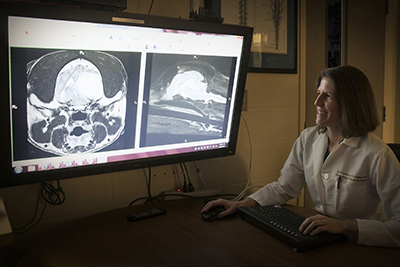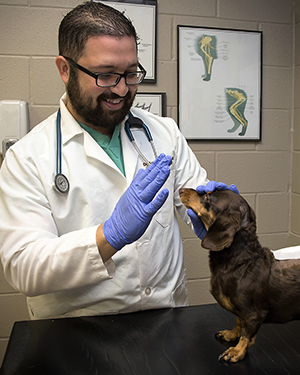Overview
The residency program at Texas A&M College of Veterinary Medicine is centered on the criteria of board certification set by ACVIM (www.acvim.org), guiding residents to achieve the knowledge, skills, and credentials to become a successful Neurologist/Neurosurgeon in either an academic setting or private practice. It is a three-year program that is designed to expose trainees to a wide array of clinical cases and research opportunities.
The Neurology Service of the Veterinary Medical Teaching Hospital (VMTH) has a busy, growing, and diverse caseload consisting of both medical and surgical cases. The diagnostic equipment available includes a 3.0 T MRI, a 40-slice/revolution helical CT scanner, CT-TOMO radiotherapy unit, digital radiography, digital fluoroscopy, a surgical ultrasonic aspirator, image-guided neurosurgery, operating microscope, kinetics/kinematics laboratory, and two electrophysiology units.
Faculty
Faculty in direct support of the program include:
- Dr. Beth Boudreau,
- Dr. Nick Jeffery,
- Dr. Sharon Kerwin,
- Dr. Jon Levine, and
- Dr. Joe Mankin, residency program director.
The program is a structured experience to provide the opportunity for the resident to prepare for the qualifying and specialty exams of ACVIM as well as promote clinical excellence in neurosurgery and medical neurology.
A wide range of specialists, including those in internal medicine, cardiology, dermatology, oncology, ophthalmology, anesthesiology, critical care, radiology, surgery, and radiation oncology, supports our program. During the resident’s training, they have the opportunity to work directly with these services to gain clinical skills and techniques necessary to be a successful neurologist. Didactic learning will include daily neurology service rounds, weekly house officer rounds, weekly neurology resident rounds, weekly MRI rounds, monthly neuropathology rounds, and biannual surgery labs.
Program
Residents are encouraged and time off is allotted to attend pertinent scientific meetings such as ACVIM and “Brain Camp”, and they have scheduled time off for general and specialty board preparation. Faculty guidance, time off clinics, and funding are provided to support resident research projects.
The residency program does not culminate in a graduate degree although candidates may elect to pursue an advanced degree through the graduate school at Texas A&M University.
For more information & to Apply
- All applications for this program should be made through the Veterinary Residency and Internship Match Program.
- Further details of our residency are available on the website (https://www.virmp.org).

Previous Residents Talk about the Program
“I can’t say enough great things about this program. It’s exactly what I was looking for and I am getting an outstanding training.” —Kimberly Anderson, DVM, PhD, Neurology Resident 2014–2017

“The neuro residency at Texas is outstanding. We have a great caseload, state-of-the-art imaging and surgical equipment, and a team of five boarded neurologists. I am so glad I considered this program.”
—Arturo Otamendi, DVM, Neurology Resident 2015–2018
